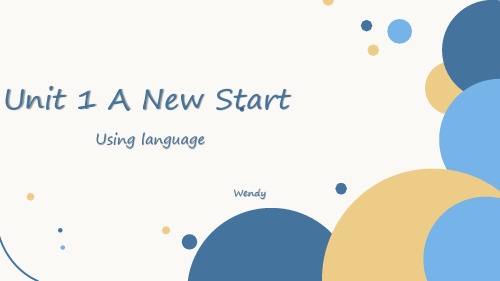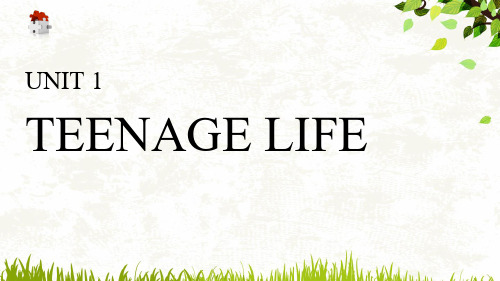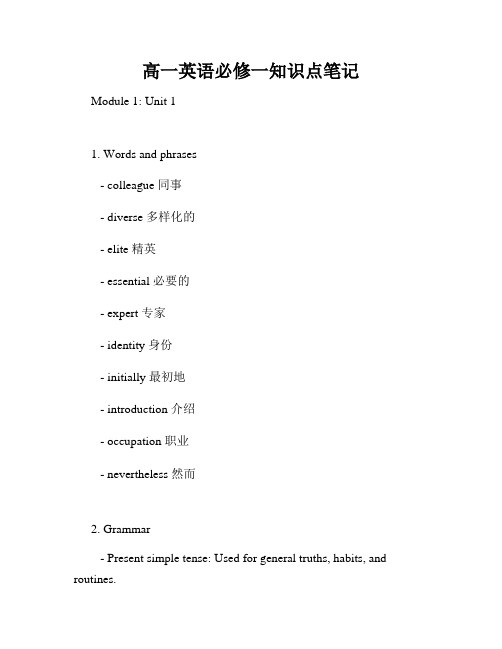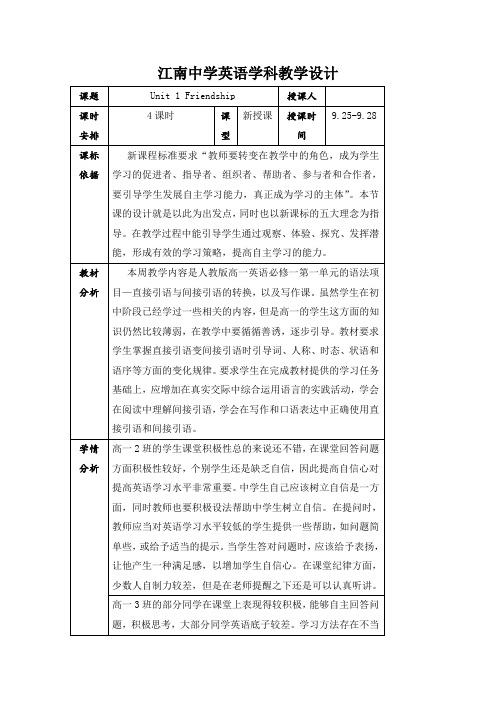人教版高一英语必修一 unit1 Grammar
新人教版高中英语必修1精品课件1:Discovering Useful Structures (Grammar)

其他表示将来时的形式: 1.be going to结构也可表示将来,表示即将发生的事或不久将要发生的事,常 与表示将来的时间状语连用。 I am going to sell this old car,and buy a new one.我打算卖了这辆旧车,买一辆新 的。 注意:There be句型的be going to结构为There is/are going to be...(注意be不能改 为have),常用来表示将有某事发生。 下个星期六在我校将有一场足球比赛。 [正]There is going to be a football match next Saturday in our school. [误]There is going to have a football match next Saturday in our school.
自我归纳 通过比较,我们可以得出:现在进行时可表(1)__将__来____,常含有“意图”“安 排”或“打算”的含义,并且可与表将来的时间状语连用。在一定的上下文语境 中,(2)_时__间__状__语_也可以不用。
语法精析
现在进行时的具体用法如下: 1.常表最近或较近的将来,所用动词多是位移动词。但偶尔也表示较远的将 来。 I'm meeting you after class.课后我来找你。 What are you doing next Sunday?下星期天你打算干什么? When I grow up,I am joining the army.我长大了要参军。
2.表将来的现在进行时有时含有“决心”的意思。 I'm not waiting any longer.我不再等待了。 I'm backing out.我要打退堂鼓了。 Don't forget:you are taking part too.不要忘记:你也要参加。 3.现在进行时也可在时间、条件或原因状语从句中表示将来。 When you are passing my way,please drop in.你什么时候路过我们家,请进来 坐坐。(时间状语从句) If they are not doing it,what am I to do?如果他们不干,那我该怎么办?(条件 状语从句)
人教版高中英语必修一unit1grammar

Whenyouchangeasentencefromdirects peechtoindirectspeech,yousometimes needtochangetheverbtense.Youmayal soneedtochangepronouns,timeinorder
tokeepthesamemeaning.
“Idon’tlikecomputers,”Sarahsaidtoherfriends.
Sarahsaidtoherfriends that Idon’tlike
computers. Sarah said
she
didn’t
Sarahsaidtoherfriendsthatshedidn’tlikecomput ers.
he
harvested Theyaskedhimwhenheharvestedthewheat.
选择疑问句
•用whether…or…表达,而不用if…or…,也 不用either…or… • Heasked,“DoyouspeakEnglishorFrench?”
• HeaskedmewhetherIspokeEnglishorFrenc h.
3.Tomsaid“Iwillseeyounextweek.” Tomsaidthathewouldseemethenextweek.
4.“Whywereyoulateagain?”Theteachersaidtome. TheteacheraskedmewhyIwaslateagain.
5.“Idon’tlikeswimming,”saidSarah. Sarahsaidshedidn’tlikeswimming.
一般疑问句
•间接引语用连词whether或if引导,原主句中 谓语动词said要改为asked(me/him/us等), 语序是陈述句的语序
新课标人教版必修一 Unit1 Grammar

Step 2: Deal with 课本P5 Ex2
1. Anne said (that) she didn’t know the address of her new home. 2. Anne told her father (that) she had got tired of looking at nature through dirty curtains and dusty windows. 3. The girl said that she needed to pack up her things in the suitcase very quickly. 4. His father asked her why she had chosen her diary and old letters. 5. Mother said to her : “ Are you very hot with so many clothes on ?” 6. “What else did you hide under your overcoat ?” Margot asked her. 7. “When shall we go back ?” Anne asked her father. 8. “ Why did you talk so much to this boy ?” Father asked Anne.
2012-12-12
2. She suffered from loneliness, but she had to learn to like it there. 她遭受孤独的折磨,但是她得学会喜欢呆在那里。 suffer vt. 遭受;忍受;经历,后面常接pain, defeat, loss, poverty, hunger等名词。 vi.受痛苦,患病。常用suffer from结构。 ① Iraq suffered serious damage from the war. 伊拉克因战争而遭受了严重的破坏。 ② He is suffering from cancer. 他患上了癌症。 3. How can Linda recover from her illness in this room ? 琳达在这个房间里怎么能够从病中康复呢……? recover vi.& vt. 痊愈;恢复;重新获得,常与介词from 连用。 ① I think he will recover from her bad cold soon. 我想不久他的重感冒会好的。 ②Jane recovered her lost wallet. 简找到了丢失的钱包。
必修一 Unit 1 Grammar-句子成分及基本句子结构

➢ e.g.
I will watch the movie.
He borrowed my key.
Time flies.
He can play basketball.
She quickly filled in the form.
句子成分
Unit 1 A new start Using language
句子成分
Unit 1 A new start Using language
表语或主语补足语 Subject complement
➢ 表语或主语补足语是接在联系动词(linking verb)之后的,用于补充说明主语所 处的状态的成分,一般由名词或形容词充当,整个句子构成所谓的“主系表”结构。 联系动词除了可以用be动词(am, is, are)构成之外,还可以用感官动词(smell, feel, taste…)充当。
c
4. I breathed deeply.
f
5. I looked at them in panic. g
6. I was embarrassed
a
7. His words made me a lot more relaxed! b
a He was friendly. b The exam made me quite nervous. c I passed him a book. d She agreed. e He wrote a long letter. f He talked loudly. g She looked after her sister patiently.
小试牛刀
造句练习
Unit 1 A new start Using language
人教版必修一unit1 grammar

AdvP
NP
The new coach told me that I didn't play well enough,but I wouldn’t give up.
My
first
NP French
class
was
very
confusing.
ThAe dtevaPcher
spoke
so
fast!
NP
AdjP
副词短语:Adv P
Adam’s challenge(s)
1.Being a freshman at senior high school is a really big challenge. 2.It's a little confusing to choose suitable courses and extra-curricular activities. I have to think very carefully and ask the school adviser for help. 3.As to extra-curricular activities, I didn’t playfootball well enough,I won't quit football and I will find a way to improve so that I can make the team. 4.I have to study much harder and be responsible for a lot more.
And I find it _k_in_d__o_f_f_u_n_n_y_感到有些可笑
I find it _k_i_n_d_o_f_s_a_d___感到有些悲伤
高一英语必修一知识点笔记

高一英语必修一知识点笔记Module 1: Unit 11. Words and phrases- colleague 同事- diverse 多样化的- elite 精英- essential 必要的- expert 专家- identity 身份- initially 最初地- introduction 介绍- occupation 职业- nevertheless 然而2. Grammar- Present simple tense: Used for general truths, habits, and routines.Example: The earth revolves around the sun.- Present continuous tense: Used for ongoing actions or temporary situations.Example: I am studying English at the moment.- Present simple vs. present continuous: The present simple is used for general truths, while the present continuous tense is used for actions happening at the moment of speaking.Example: She always drives to work. (Present simple)She is driving to work now. (Present continuous)- Adverbs of frequency: Used to indicate the frequency of an action.Example: I often go to the gym.Module 1: Unit 21. Words and phrases- accomplish 完成- ambition 雄心- conscious 有意识的- fulfill 实现- goal 目标- grateful 感激的- influence 影响- motivation 动机- overcome 克服- passion 热情2. Grammar- Modal verbs: Used to express ability, possibility, permission, and necessity.Example: You can call me later. (Permission)They must be at the airport by now. (Necessity)- Conditional sentences: Used to express outcomes based on certain conditions.Example: If it rains, we will stay at home.- Passive voice: Used when the subject of the sentence is acted upon.Example: The book was written by Mark Twain.- Indirect speech: Used to report what someone else said.Example: She said that she was tired.Module 2: Unit 11. Words and phrases- adapt 适应- behavior 行为- communicate 交流- conflict 冲突- contribute 贡献- ignorance 无知- respect 尊重- tolerate 容忍- value 价值观- viewpoint 观点2. Grammar- Comparative and superlative forms of adjectives: Used to compare two or more things.Example: He is taller than his sister. (Comparative)It is the most beautiful city in the world. (Superlative)- Adverbs of manner: Used to describe the way an action is performed.Example: She sings beautifully.- Conditional sentences (second and third conditionals): Used to talk about hypothetical situations and their outcomes.Example: If I had more money, I would travel the world. (Second conditional)If I had studied harder, I would have passed the exam. (Third conditional)Module 2: Unit 21. Words and phrases- adventure 冒险- authentic 真实的- civilization 文明- destination 目的地- landscape 风景- mainland 大陆- minimize 最小化- remote 偏远的- spectacular 壮观的- unique 独特的2. Grammar- Reported speech: Used to report what someone else said, thought, or believed.Example: She told me that she was going to the party.- Reported questions: Used to report questions in indirect speech.Example: She asked me if I had seen her keys.- Passive voice: Used when the subject of the sentence is acted upon.Example: The bridge was built in 1870.- Relative clauses: Used to provide additional information about a noun.Example: The book that you gave me is very interesting.Note: This is a brief summary of the knowledge points covered in the first module of the first compulsory English course for Year One. Please refer to the textbook for more detailed explanations, examples, and exercises. Happy studying!。
新版高一Unit 1重点语法Grammar 定语从句-高一必修二重难点易错题精练人教版

新版高一Unit 1重点语法Grammar 定语从句-高一必修二重难点易错题精练人教版Unit 1单元重点语法专项练习(单项选择+单句语法填空)定语从句一、单项选择1.Usually my schedule is full and Sunday is the only day ______ I can enjoy my free time.A.that B.which C.when D.where2.The United Kingdom is one of the countries ______ people drive on the left.A.which B.that C.where D.when3.Endurance, perseverance, industry and talent are the means ________ men achieve great ends.A.in which B.by which C.of which D.on which4.Wind power is an ancient source of energy ________ we may return in the near future. A.on which B.from which C.by which D.to which5.The reason ________ he was late for the meeting is ________ his car broke down on the road.A.for which, because B.that, thatC.why, because D.why, that6.There were dirty marks on her trousers _________ she had wiped her hands.A.where B.which C.when D.that7.Do you know anything about the accident _________ in the street yesterday? A.happened B.was happeningC.which happened D.which was happened8.He is the very man in ________ pocket I found my lost money.A.that B.who C.whom D.whose9.Learning English is quite like walking in a long journey _________ sweat, diligence and hard work are needed.A.which B.that C.where D.whose10.In the digital age, we are able to find people________ share our interests more easily. A.when B.which C.where D.who11.He lived in a small village ________ was a long way from the railway station. A.which B.what C.where D.when12.Mr. Lin, without ________ we wouldn’t have succeeded, deserves to be crowned as the VIP of our team.A.what B.whom C.which D.whose13.I will never forget the people__________helped me a lot during my hard time.A.which B.who C.whose D.whom14.The only thing________ many of the papers focus their attention is the argument about the statements made by the foreign secretary.A.which B.that C.on which D.on that15.Life is like a long race________ we compete with others to go beyond ourselves. A.which B.what C.that D.where16.We’ll call on a man ________ I believe can give us very good advice.A.which B.whoC.whom D.whomever17.After working for 10 years, I find teaching is a job ________you are doing something serious but interesting.A.that B.which C.when D.where18.—What do you think of the activity organized by our school last Saturday?—It really gave us a platform ___________ we learned team spirit.A.that B.where C.which D.when19.It is one of the most surprising moments in Oscar history________actor Will Smith walked on stage and slapped Chris Rock for a joke________Rock made about Smith’s wife's hair.A.which; that B.that; when C.when; that D.which; which20.________ they need is a fast Internet connection ________ can be trusted. A.What; that B.All what; that C.All that; what D.That; what二、用单词的适当形式完成句子21.The people in Syria have been looking forward to the day ______ the conflict will end.22.Lisa is an outstanding graduate ______ life stories have greatly inspired her fellow schoolmates.23.Put simply, potential is your natural ability _________ can be developed when you try hard enough.24.I have reached a point in my life _________ I am supposed to make up my mind. 25.They are now in a better position _________ they can be very successful this year. 26.Why do you choose to ask him questions at a time _________ he is unhappy? 27.It was a time _________ people weren’t so hung up about health.28.It’s one of the f ew countries___________ people drive on the left.29.She will never forget the days ________she spent in Beijing.30.There are many people________ only online activity is sending and receiving e-mails.31.Are you the man ________bicycle was stolen?32.Do you know who is living in the house________ windows face south?33.It was the midnight________ my father woke me up and told me to watch the football game.34.Was it at the school ________ he spent his childhood?35.Is this the museum ______ you once visited?36.Do you still remember the days________ we studied together?37.She’ll never forget her stay there ____ she found her son who went missing two years before.38.Do you know the reason _______Jim failed to come today?39.I will never forget the months ________I spent with my cousin in Beijing. 40.People are living in an age ________many jobs are done on computer.41.The dogs were well trained by their masters ________ had great experience with caring for these animals.42.Anyone______ has helped to rescue the drowning girl is worth praising.43.I talked with the man______house was destroyed in the flood.44.Do you know the lady with______our English teacher is talking under the big tree? 45.We often talk about the things and persons________we remember at school. 46.The rescue workers brought tents and lamps to the shelters ________ the victims were staying.47.Tom took the police to the spot________ the accident happened.48.He’s got himself into a dangerous situation ________he is likely to lose c ontrol over the plane.49.He told the truth to the manager in a way________ surprised everyone present at the meeting.50.He is my father ________ is an English teacher.51.This is the girl __________ English is the best in our class.52.I’d like a room ________window faces the sea.53.The book ________ I borrowed from the library yesterday has been lost.54.A contest is a competition or game in ________ people try to win.55.The T-shirt I received is not the same one _________ is shown online.56.We are just to reach a point ________ both sides will sit down together and talk. 57.The house _______which he paid 200,000 yuan is now worth 350,000yuan.58.He resigned from the company in order to find a better position _________ he could give his ability into full play.59.The village has developed a lot ________ we learned farming two years ago. 60.In my opinion, anyone _________ is anxious about the result will fail after all. 61.—Where did you get to know her?—It was on the farm _________we worked.62.On average, 15 per cent of the criminals ________are set free tend to commit crimes again.63.After the crash, 80 per cent of the passengers_______ recovered from the shock somehow suffered a slow reaction.64.The medicine ________ he bought is good for your health.65.A series of exchange activities ________ we organised in digital technology have achieved great success.66.There was a time ________ women were looked down upon and could not find satisfying jobs.67.Keep away from such persons ______________will do you no good.68.This is the village ________ we visited last week.69.The teacher asks us to pay attention to everything ________ he does.70.Mr Black would never forget the day ________ he joined the army.三、用单词的适当形式完成短文阅读下面短文,在空白处填入1个适当的单词或括号内单词的正确形式。
高中英语必修一unit1+Friendship+grammar%26writing+教案

江南中学英语学科教学设计Step 2 Review1.Personal Pronoun2.Possessive Pronouns3.Do exercise 针对作业中大部分同学人称混乱的问题,进行一个补充讲解。
通过提问和复述的方式,师生一起共同回忆。
通过当堂的练习,巩固学生所学知识。
当堂检测有效练习一. 从括号内选择正确的代词填空1. Your clothes are on the desk.Please put _________(they,them,their,theirs) away.2. (We,Us,Our,Ours)_________ English teacher is Mrs. Green.We all like _________(she,her,hers).3. (I,Me,My,Mine)_________ can't get my kite.Could you help _________(I,me,my,mine)?4. Tom can't get down from the tree.Can you help _________(he,him,his)?5. Her kite is broken. Can _________(you,your,yours) mend it?作业布置填入正确的人称代词和物主代词1. This isn't her knife. _________ is green.2. These are your books,Kate. Put __________ in the desk,please.3. They want a football. Give __________ the green one,please.4. _____ is a boy. _____ name is Mike. Mike's friends like _____ very much.5. My father and mother are teachers. _____ are busy.6.You are a pupil. Is _____ brother a pupil, too?7. Mary works in a book store. ________likes________work very much.8. John and I are in the same school. ________go to school together.9. She is a friend of ________ . We knew each other two years ago.10. I have many friends. Some of ________are good at English.板书设计Review Lesson 1.Personal Pronoun2.Possessive Pronouns。
人教高中英语必修1Unit1grammar(共21张PPT)

人教高中英语必修1Unit1grammar(共 21张PPT) 人教高中英语必修1Unit1grammar(共 21张PPT)
人教高中英语必修1Unit1grammar(共 21张PPT) 人教高中英语必修1Unit1grammar(共 21张PPT)
人教高中英语必修1Unit1grammar(共 21张PPT) 人教高中英语必修1Unit1grammar(共 21张PPT)
4. The hotel _____we lived during our holidays stands by the seaside.
5. The place _______interested me most was the Children's Palace.
6. That is the day ______I'll never forget.
人教高中英语必修1Unit1grammar(共 21张PPT) 人教高中英语必修1Unit1grammar(共 21张PPT)
人教高中英语必修1Unit1grammar(共 21张PPT) 人教高中英语必修1Unit1grammar(共 21张PPT)
人教高中英语必修1Unit1grammar(共 21张PPT)
人教高中英语必修1Unit1grammar(共 21张PPT) 人教高中英语必修1Unit1grammar(共 21张PPT)
人教高中英语必修1Unit1grammar(共 21张PPT) 人教高中英语必修1Unit1grammar(共 21张PPT)
人教高中英语必修1Unit1grammar(共 21张PPT) 人教高中英语必修1Unit1grammar(共 21张PPT)
用正确的关系代词或关系副词填空
人教版高中英语课件 必修一第一单元M1unit 1teenage life grammar

自主探究 ①These red roses are for you, 这些红玫瑰是送给你的。 (名词短语these red roses 的构成形式为:限定词十形容词+名词,该短语在句中充当主语) ②I have three close friends. 我有三个要好的朋友。 (名词短语three close friends的构成形式为:限定词+形容词+名词,该短语在句中充当宾语) ③He is my best friend. 他是我最好的朋友。 (名词短语my best friend的构成形式为:限定词十形容词+名词,该短语在句中充当表语) ④There are some red roses on that small table.在那张小桌上有一些红玫瑰。 (名词短语some red roses的构成形式为:限定词+形容词+名词+介词短语,该短语在句中 充当主语;另外, the small table也是名词短语,在句中作介词on的宾语)
语法思考:
高中阶段常见的短语主要有几种? 在高中阶段,常见的短语形式有:名词短语(Noun Phrases)、形容词短语
(Adjective Phrases)、副词短语(Adverb Phrases)、介词短语及动词短语(Verb Phrases)等。本单元只讲解前面三种形式。
学习英语短语或者词组的意义是什么? 短语或词组(Phrases)是具有一定意义但不构成句子或从句的一组词。了解
人教版必修第一册
Unit 1 Teenage Life Period 3 Discovering Useful Structure
Phrases—短语(词组)
Discovering Useful Structures
高一英语 Unit 1《Friendship》Grammar同步练习 新人教版必修1

Friendship直接引语和间接引语练习I. 请选出正确的答案:1. “You’ve already got well, haven’t you?” she asked.→She asked ________.A. if I have already got well, hadn’t youB. whether I had already got wellC. have I already got wellD. had I already got well.2. H e asked , “ Are you a Party member or a League member?”→He asked me _________.A. am I a Party member or a League memberB. was I a Party member or a League memberC. if I was a Party member or a League memberD. whether was I a Party member or a League member.3. He asked, “How are you getting along?” →He asked _______.A. how am I getting alongB. how are you getting alongC. how I was getting alongD. how was I getting along4. He asked me ________ with me.A. what the matter isB. what the mater wasC. what’s the matterD. what was the matter5. He said, “Don’t do that again.” He _____ me _______ that again.A. said to me; not to doB. said to me; don’t doC. told me; don’t doD. told me; not to do6. Can you make sure ___________?A. that he will come here todayB. when he will come he re todayC. will he come here todayD. whether will he come here today7. Do you happen to know ________?A. where is her addressB. in which place is her addressC. what her address isD. the place her addres s is8. Excuse me, but can you tell me ___________?A. where can I get to the libraryB. where I can get t o the libraryC. how can I get to the libraryD. how I can get to the library9. John asked me _______ to visit his uncle’s farm with him.A. how would I likeB. if or not would I lik eC. whether I would likeD. which I would like10. I’d like to know ________ Chinese.A. when he began to learnB. when did he begin to learnC. when did he begin learningD. for how long he began to learnII. 将下列句子变为间接引语:1. “You should be more careful next time,”his father said to him .2. Mr. Wang said,“I will leave for Shanghai on business next month, children”3. “I haven’t heard from my parents these days,”said Mary.4. The geography teacher said to us, “The moon moves around the ea rth and the earth goes round the sun.”5. She said to him, “It’s time that you left here.”6. Zhang Hong said to me, “Doctor Wang passed away in 1948.”7. John said to his parents, “I had learned 500 Chinese words by the end oflast term.”8. The history teacher said to them, “The Chinese Communist Party w as founded on July 1st ,1921.”9. He said, “Are you a student?”10. “Have you anything interesting I can read, George?”she said.11. “She’s here to ask for help, isn’t she?”he asked.12. “Where are you going?”the father asked his son.13. “Are you sorry for what you have done?”the mother asked the naughty boy.14. She said, “Did you meet this man at the station two hours ago , Mr. Li?”15. “Write your names on your papers first,”the teacher said to us.16. “Please come here again tomorrow,”her friend said to her.17. “Let me pack the parcel for you,”he said.18. “Don’t make so much noise in class, boys and girls,”said the teacher.19. “What a lovely day it is!”20. “Happy New Year to you!”he said.III. 把下列句子变为直接引语:1. I told him that I had lost my money and that I would find it.2. She asked whether I would be free the next day or not.3. I asked her where she was going and what she was going to do the next day.4. His father told him not to climb that high tree in his new coa t.5. The stranger asked me what my name was.6. She said that she would finish her work the next day.7. The teacher asked if we could do it.8. The commander ordered his men not to cross the river before dawn .9. My teacher asked whether he was coming.10. The scientist asked me what I was doing.答案I. 1~5 B C C D D 6~10 A C D C AII.1. His father told him that he should be more careful the next time.2. Mr. Wang told the children that he would leave for Shanghai on business the next month.3. Mary said that she hadn’t heard from her parents those days.4. The geography teacher told us that the moon moves around the ear th and the earth goes round the sun.5. She told him that it was time that he left there.6. Zhang Hong told me that Doctor Wang passed away in 1948.7. John told his parents that he had learned 500 Chinese words by the end of last term.8. The history teacher told them that the Chinese Communist Party wa s founded on July 1st, 1929. He asked whether I was a student.10. She asked George if he had anything interesting she could read.11. He asked whether she was there to ask for help or not.12. The father asked his son where he was going.13. The mother asked the naughty boy if he was sorry for what he had done.14. She asked Mr. Li whether he had met that man at the station t wo hours before.15. The teacher told us to write our names on our papers first.16. Her friend asked her to go there again the next/ following day.17. He offered to pack the parcel for me.18. The teacher told the boys and girls not to make so much noise in class.19. He/ She exclaimed that it was really a lovely day.20. He wished me a Happy New Year.III.1. I said to him, “I have lost my money. I will find it.”2. She asked, “You will be free tomorrow, won’t you?”3. I asked her, “Where are you going and what are you going to d o tomorrow?”4. His father said, “Don’t climb this high tree in your new coat.”5. The stranger asked, “What’s your name?”6. “I’ll finish my work tomorrow,”she said.7. The teacher asked, “Can you do it?”8. The commander ordered his men, “Don’t cross the river before da wn.”9. My teacher asked, “Is he coming?”10. The scientist asked me, “What are you doing?”。
高一英语必修一UnitGrammar语法直接引语间接引语.pptx

直接引语与间接引语相互转化时 应注意的变化
第3页/共25页
一.陈述句的变化
第4页/共25页
1.结构变化 1). 陈述句变间接引语时,用that连接, that 无 实际意义,可省略。例 :
“I don’t like computers,” Sarah said to her friends. Sarah said to her friends that I don’t like
They asked him when you buy the bike.
he bought
They asked him when he bought the bike.
第24页/共25页
感谢您的观看。
第25页/共25页
C. he
should…tomorrow
D. he would …the next day
第20页/共25页
5. Jack said that he was a teacher. “______________”,Jack said.
A. I am a teacher B. I was a teacher C. I will be a teacher D. I had been a teacher
• They said that they had seen her in the street.
主句:一般• 过去时
从句:过去完成时
• 3. Cellar said, “I have not heard from Jordan since May.” • Cella said that she had not heard from Jordan since May.
人教高中英语必修一unit 1 grammar

现在完成进行时
一般过去时
过去完成进行时
过去完成时
(直)The old man said, I have lived in this street since 1960.老人说:“从1960年以来我一直住 在这条街上”。 (间)The old man said that he had lived in that street since 1960.那老人说他自从1960年起就 住在那条街上了。 (直)“ I don’t want to set down a series of facts in a diary,” said Anne. 安妮说:“ 我不想在日 记里记流水帐。” (间)Anne said that she didn’t want to set down a series of facts in a diary.安妮说她不想在日记 里记流水帐。
状语的变化
时间由“现在”改为“原来”;地点由“此”改为“彼”。
直接引语 this here these bring come today
间接引语 that there those take go that day
直接引语 this week ( month, etc)
间接引语 that week (month ,etc)
“二随宾”是指直接引语变间接引语时,若 从句中的主语及宾语是第二人称,或被第 二人你所修饰,从句中的人称要跟引号外 的主句的宾语一致。 (直)He said to her, where did you put the glasses? 他问她:“你把杯子放哪儿了”? (间)He asked her where she had put the glasses.他问她,她把杯子放哪儿了。
人教版高中英语必修一 Unit1 Grammar名师课后评估单

Unit1 语法课名师课后评估单【教材版本与册数】人教版必修1【单元名称】Unit1:Friendship【课时】第3课时【课型】Grammar(语法课)Part 1基础达标题:I. 将所给直接引语变为间接引语,每空一词:1. “I am having supper,”he said.He said that _______ _______ having supper.2. “I’ve seen the film,”Gina said to me.Gina _______ me that she _______ _______ the film.3. “I went home with my sister,”she said.She said that _______ _______ _______ home with her sister.4. The teacher said, “The sun is bigger than the moon.”The teacher said that the sun _______ bigger than the moon.5. “I met her yesterday,” he said to me.He told me that he _______ met her the day _______.6. “You must come here before five,” he said.He said that I _______ to go _______ before five.7. “I bought the computer two weeks ago,” she said.She said that she _______ bought the computer two weeks _______.8. “Did you read the book last week?” he said.He _______ _______ I had read the book the week _______.9. He said, “You can sit here, Jim.”He _______ Jim that he _______ sit there10. He asked, “How did you find it, mother?”He asked her mother _______ _______ _______ found it.Part 2能力提升题:I. 把下列的句子变成间接引语或直接引语:1. “I’m leaving for London next week.” My sister said to me.2. John said, “Mr. Smith has come here.”3. She said, “Do you want me to help you?”4. “Does the man in the shop find his wallet at last?” She said.5. Mum said to th e newcomer, “Can you speak English?”6. Father asked me who had broken the window.7. She asked me which one I liked the best.8. He asked whether I had watched TV the night before.9. Jim asked me if I was busy that day.10. Pick said that he would take Mary there the next time.【参考答案】Part 1基础达标题:1. he, was。
人教版高一英语必修一Unit1 Grammar课件

b. Change personal pronouns:
He said, “I like it very much.” He said that he liked it very much.
Mum said to me, “Yo can do it yourself.” Mum told me that I could do it myself.
Past continuous Past perfect
Past perfect Past perfect
Present perfect continuous
Indirect speech Future in the past
Past perfect
Past perfect con-tinuous
1. The boy said, “I will be a pilot.” The boy said that he _w_o_u_l_d_b__e a pilot.”
4. “Why did you choose your diary and old letters?” her father asked her.
Her father asked her why she chose / had chosen her diary and old letters.
5. Mother asked her if/whether she was very hot with so many clothes on.
Direct speech this these
Indirect speech that those
here come bring
there go take
- 1、下载文档前请自行甄别文档内容的完整性,平台不提供额外的编辑、内容补充、找答案等附加服务。
- 2、"仅部分预览"的文档,不可在线预览部分如存在完整性等问题,可反馈申请退款(可完整预览的文档不适用该条件!)。
- 3、如文档侵犯您的权益,请联系客服反馈,我们会尽快为您处理(人工客服工作时间:9:00-18:30)。
2. “I like reading stories,” said John. John said that he liked reading stories. 3. “I don’t like cars,” Sarah said to him. Sarah told him that she didn’t like cars.
3.其他变化
now today this week yesterday last week four days ago tomorrow next month the day after tomorrow the day before yesterday
直接引语
间接引语
then that day that week the day before the week before four days before the next day the next month in two days’ time two days before
5. Mother asked her if/whether she was very hot with so many clothes on. “Are you very hot with so many clothes on?” Mother asked/said to her. 6. Margot asked her what else she had hidden under her overcoat. “What else have you hidden under your overcoat?” Margot asked her.
2. Mum said to me:“ You can do it yourself.” Mum told me that I could do it myself. 3. Mr. Smith said, “He is a good worker.’’ Mr. Smith said that he was a good worker.
疑问句变为间接引语时, 除了 要把疑问语序改为陈述语序, 由whether/if 或特殊疑问词引 导外, 人称、时态和状语等也 要作相应地变化。
1. “I don’t know the address of my new home,” said Anne. Anne said that she didn’t know the address of her new home.
4. Tom said, “We are listening to music.”
Tom said that they ______________ were listening to music. 5. Mike said, “I have finished my homework.”
Mike said he _____________ had finished his homework.
2. “I’ve got tired of looking at nature through dirty curtains and dusty windows,” Anne said to her father. Anne told her father that she had got tired of looking at nature through dirty curtains and dusty windows.
She name She said said that that her she after and only hiding her true was Anne Frank and family family friend there for was were a Kitty long hiding — time, her in her Amsterdam. she diary. had was Jewish. become crazy about nature.
1. Jack said to me, “You look worried today.” Jack told me that __ I looked worried that day. 2. We said to her, “They’re cleaning the room.” they were cleaning the room. We told her that ____ 3. Mr. Black said, “I have walked a long way.”
时 间 状 语
直接引语 指示代词 地点状语
this
these
间接引语
that
those
here
come bring
there
go take
方向性动词
They asked, “Is it easy to solve the problem?”
They asked if / whether it is easy to solve the problem
2. 直接引语转变为间接引语时,人称要 进行相应变化;且主句动词为一般过 去时时,从句动词时态应为过去时的 相应时态。
1.人称的变化
直接引语里的第一人称和第二人称,变间
接引语时,人称要做相应调整。
1. She said: “I am hungry.”
She said she was hungry.
said Tom. Tom said that he ______ didn’t want to go
there with Alice.
3. The boy said: “I will be a pilot.”
The boy said that he ________ would be a pilot.”
直接引语(变化前)
一般过去时 “I saw her last Monday,” he said.
间接引语(变化后)
过去完成时 He said he had seen her the previous Monday.
过去进行时 过去完成进行时 “I was waiting for She said she had Jim,” she said. been waiting for Jim.
7. Anne asked her father when they would go back home. “When shall we go back home?” Anne asked her father. 8. Father asked Anne why she had talked so much to that boy. “Why did you talk so much to that boy?” Father asked Anne.
he had walked a long way. Mr. Black said that __
2.时态变化
直接引语变间接引语时,间接引语的时态 要与主句的时态一致。
1. 主句为一般现在时, 现在完成时或一般将
来时的时候, 间接引语时态不变。Байду номын сангаас
He says: “I treat you as my son.”
He says that he treats me as his son.
2. 当主句为过去时, 从句要跟着相应的变化。
直接引语(变化前) 一般现在时 “I know it,” he said. 现在进行时 “I’m making coffee for you all,” she said. 间接引语(变化后) 一般过去时 He said he knew it. 过去进行时 She said she was making coffee for us all.
Jack said Rick had been ill for many days till he died.
一般现在时 现在完成时 现在进行时 一般将来时 一般过去时
过去完成时 过去进行时
一般过去时 过去完成时 过去进行时 过去将来时 过去完成时
不变
1. “It is really cold,” she said to me. She told me that it ____ was really cold. 2. “I don’t want to go there with Alice,”
3. “I need to pack up my things in the suitcase very quickly,” the girl said. The girl said that she needed to pack up her things in the suitcase very quickly. 4. “Why did you choose your diary and old letters?” her father asked her. Her father asked her why had chosen her diary and old letters.
was
They asked if it was easy to solve the problem.
He asked,“ When do you harvest the wheat? ” He asked when you harvest the wheat. we harvested
They asked when we harvested the wheat.
直接引语(变化前) 现在完成时 “I have seen her before,” said he. 现在完成进行时 He said, “I have been doing it for hours.”
间接引语(变化后) 过去完成时 He said he had seen her before. 过去完成进行时 He said he had been doing it for hours.
